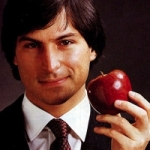SolutionOne Blog
Steve Jobs and His Impact on the Tech World
Apple CEO Steve Jobs has resigned from the consumer electronic company. Leaving behind a legacy that has made Apple considered ahead of the curve technology-wise several times, and has changed the game in the industries that he's touched. While Microsoft still rules the personal computer market globally towering over OSX's 8.3% market share, Apple has certainly played a major roll in paving a path to high-end electronics and devices over the past decade that has raised the bar for companies, and has even created a few new industries to boot.
However, Apple, like Steve, had humble beginnings. Steve Jobs started Apple with partner Steve Wozniak in 1976. Apple's first office was Jobs' garage where they were building the computers that they were selling.
From Apple's humble beginnings spawned the Apple II, the first real PC to hit it big. While the power of computers had once been only available to large businesses who could afford the staggering price-point, it was now available to classrooms, dens, and offices. The Apple II sold for about $1300, compared to similar solutions that were around $8000. In the late 1970's, that was more than enough for a new car. (For a quick inflation formula, multiply everything by 5 and round up).
In 1984, Apple revolutionized the market again with the first Macintosh computer. The Mac's announcement was launched with the now famous "1984" commercial. The Macintosh soared in the publishing market due to its (at-the-time) advanced graphic capabilities combined with the "LaserWriter" and "PageMaker" programs. Apple was making computing possible for businesses and schools, and inspired other manufacturers and software developers. Fast forward to 1997, Steve Jobs returns to a floundering Apple and announces the creation of the Apple Store, and that they will be joining Microsoft with releases of Apple versions of Microsoft Office.
In 1998, Apple releases the iMac, an All-in-One computer that featured modern technology in a unique design. The computer sold 800,000 units in the first six months. This was the beginning of what would become the giant that we know Apple as today.
The computer industry isn't the only industry that Jobs has spun on its head. Jobs had purchased what is now known as Pixar in 1986, now famous and critically acclaimed in the film industry as innovators in computer generated animation. In 2001, Apple introduces the iPod MP3 player which becomes the industry standard. Jobs followed that up with the release of iTunes in 2003. iTunes became the first online service to convince the record labels to sell their music online.
However, Steve wasn't done yet. In 2007, Apple released the iPhone which set the early standard for the smartphone industry, bringing it to consumers. While Microsoft and RIM had successfully penetrated the business world with feature-rich smartphones, Apple's iPhone light the mobile device fire. With the colorful and full screen GUI, to the versatility of the applications (an industry that didn't truly get kicked off until the time) you could download and the additional functions that the phone had, it was a game changer.
However, let us not forget the last industry Steve Jobs touched. Last year, Apple launched the iPad, a Tablet (another industry that couldn't break into the consumer market until Apple dove into it) similar in format to their iPhones. While originally scoffed at, the tablet market has emerged into a very competitive market with many different tablets vying for your dollar.
While one of the tech world's leading innovators is putting his hat up and calling it a day, the question is will Apple continue to innovate and push new technologies to the mainstream. With a strong foundation of premium products and a passionate fanbase, Apple will likely continue to be a strong entity and will still maintain that unique stroke of genius that Jobs put into every brick of that company. Whether you are a fan of the consumer electronics giant or not, it must be said that Jobs' energetic passion and strong leadership are inspirational, and Apple's explosive control over the consumer-tech market has a heavy impact on technology and the way we interact with technology today.

Comments